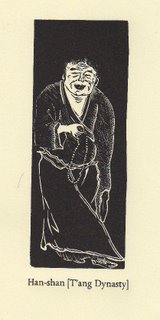cold mountain
Han-shan (trans. as Cold Mountain) is a legendary figure in both Chinese literature and Ch’an teaching. Very few facts about his life are known. After he lost his family, supposedly, his home became a huge cave – 60 meters wide, 30 deep & 10 high – in the mountains not far – a two-day walk – from the East China Sea. Giving himself the name Han-shan, the name of his chosen home, he devoted himself to meditation and writing. His writing was in the form of paintings of his poems that he left on trees, mountain rocks, and temple walls.
His place in the canon of Ch’an and Zen writing is unique since he, unlike his fellow teachers in the Way, was a mere layman, and had no formal training with Ch’an masters. Only 307 poems survive, less than half of his original works, yet he is one of the most important and influential of all Chinese writers – and some would argue the most. I’m one of those.
Gary Snyder and Burton Watson have translated, quite beautifully, Han-shan’s works, but my preference is Red Pine’s (Bill Porter) translations – The Collected Songs of Cold Mountain (Copper Canyon, 2000, revised).
When the poet uses Han-shan in the works, sometimes he’s referring to his name, his mountain home, a lifestyle, or his being. Sometimes his intention is all four meanings at once.
*
#97
Steam some sand for you dinner
when you’re thirsty dig a well
polish a brick with all your might
you still won’t make a mirror
the Buddha said we’re basically equal
we share the same true nature
figure it out for yourself
give up this useless struggle
#302
The mountain I live on
nobody knows
inside the clouds
it’s always deserted
#16
People ask the way to Cold Mountain
but roads don’t reach Cold Mountain
in summer the ice doesn’t melt
and the morning fog is too dense
how did someone like me arrive
our minds are not the same
if they were the same
you would be here
#48
Beneath high cliffs I live alone
swirling clouds swirl all day
inside my hut it might be dim
but in my mind I hear no noise
I passed through a golden gate in a dream
my spirit returned when I crossed a stone bridge
I left behind what weighed me down
my dipper on a branch click clack
#180
I reached Cold Mountain and all cares stopped
no idle thoughts remained in my head
nothing to do I write poems on rocks
and trust the current like an unmoored boat









2 comments:
Dear Sam,
I've read Snyder's version and the one you like seems intentionally less "poetic" and truer to the original.
I never really enjoyed Dante until I found a version in Penguin Paperback Books that has unrhymed tercets, therefore more faithful to the Italian. So many translations are rhymed in terza rima, but I say, what's the point? Nice if one has a personal long-term translator, the way Milosz had Robert Haas.
Thanks for all your kind comments on my poems. Perhaps I should submit to Blue Fifth Review. Isn't Harlequin involved there in some way? I think I posted in your workshp a couple of times when Teresa White was monitor. That's the ticket! My synapses still fire. And the name of that Dante translator I like is Mark Musa.
Your point about Red Pine's translations is exactly right. His versions are tied more closely to Han-shan's original works. That's what draws me to his versions.
I think that Milosz and Hass worked so closely together for so long that their rhythms are so similar. They make a good duet. I've been reading Milosz a great deal-- and recently read Second Space, his last book. Interesting work.
I'm familiar with Teresa White's poetry from a number of magazines, but she's never had work at Blue Fifth Review.
Thanks for the comment.
Post a Comment